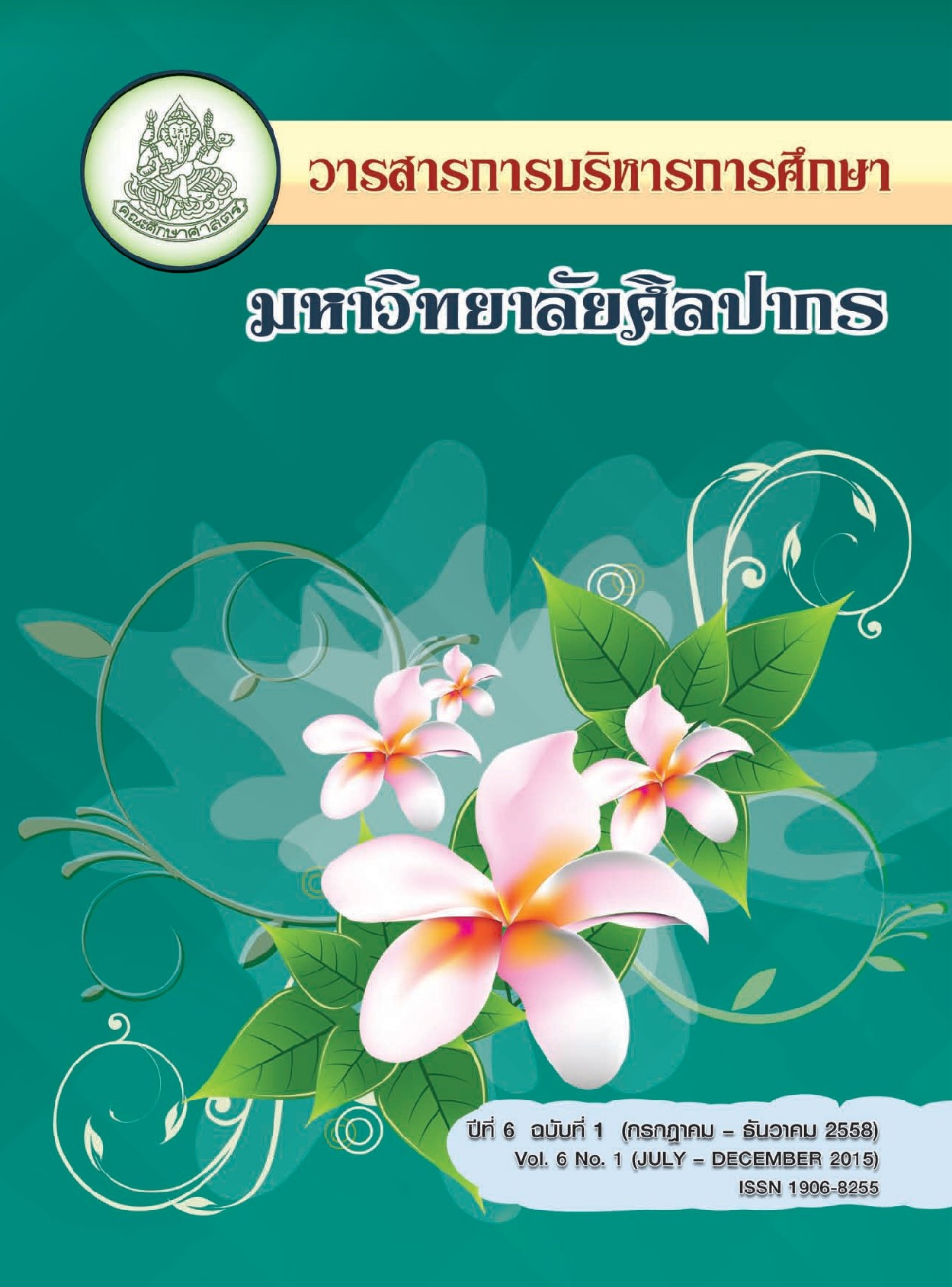การจัดกิจกรรมวิชาการตามโครงสรางของศูนยการศึกษานอกระบบ และการศึกษาตามอัธยาศัยอำเภอทามะกา
บทคัดย่อ
การวิจัยครั้งนี้มีวัตถุประสงคเพื่อทราบ 1) การจัดกิจกรรมวิชาการตามโครงสรางของศูนย กศน.อำเภอทามะกา 2) แนวทางการพัฒนาการจัดกิจกรรมวิชาการตามโครงสรางของศูนย กศน.อำเภอทามะกา ผูใหขอมูล คือ กลุมบุคลากรทางการศึกษา จำนวน 15 คน และผูรับการบริการทางการศึกษา จำนวน 15 คน รวมทั้งสิ้น 30 คน เครื่องมือที่ใชในการวิจัยเปนแบบสอบถามเกี่ยวกับการจัดกิจกรรมวิชาการตามโครงสรางของสถานศึกษา สถิติที่ใช คือ คาความถี่ รอยละ คามัชฌิมเลขคณิต สวนเบี่ยงเบนมาตรฐาน และการวิเคราะหเนื้อหา
ผลการวิจัยพบวา
1. การจัดกิจกรรมวิชาการตามโครงสรางของศูนย กศน.อำเภอทามะกา โดยภาพรวมอยูในระดับมาก เรียงตามลำดับคามัชฌิมเลขคณิตจากมากไปนอย ดังนี้ การศึกษาเพื่อพัฒนาสังคมและชุมชน การศึกษาเพื่อพัฒนาทักษะอาชีพ การจัดกระบวนการเรียนรูตามหลักปรัชญาของเศรษฐกิจพอเพียง การศึกษาเพื่อพัฒนาทักษะชีวิต หองสมุดประชาชน สงเสริมการรูหนังสือ และการศึกษานอกระบบระดับการศึกษาขั้นพื้นฐาน
2. แนวทางการพัฒนาการจัดกิจกรรมวิชาการตามโครงสรางของศูนย กศน.อำเภอทามะกา มีแนวทางดังนี้ 1) กำหนดใหเรียนรูตามความสนใจและการใชรายการโทรทัศนเพื่อการศึกษา 2) ใหสงเสริมหองสมุดประชาชนใหเปนหองสมุดมีชีวิต 3) ใหมีการพัฒนาระบบฐานขอมูลผูไมรูหนังสือ 4) นิเทศติดตามหลักสูตรอาชีพ 5) ใหมีการบูรณาการทักษะชีวิตในกลุมสาระการเรียนรูทั้ง 8 สาระ 6) ใหมีการบูรณาการความรู ทักษะสำหรับการศึกษาเพื่อพัฒนาสังคมและชุมชนโดยใชชุมชนเปนฐาน 7)กำหนดใหยึดหลักสำคัญในการพัฒนาคนใหเปนศูนยกลางโดยปลูกฝงหลักปรัชญาของเศรษฐกิจพอเพียง ใหเกิดความตระหนักและฝงรากลึกภายในอยางยั่งยืน
MANAGEMENT OF ACADEMIC ACTIVITIES BASED ON THE STRUCTURES OF THAMAKA
DISTRICT NON – FORMAL AND INFORMAL EDUCATION CENTER
The objectives of this research were to determine 1) the academic activities as preferred by the Thamaka district non-formal and informal education center. 2) the acknowledge ways to improve the deployment of academic activities as preferred by the Thamaka district non-formal and informal education center. The respondents were 30 persons divided into two groups; group of personnel, comprised of executives - government officer, employees and temporary workers totally 15 persons and group of audience, an academic career, agriculture, industry and services totally 15 persons. The instruments used in this research were a questionnaire about the event, academics, according to the structure of the Thamaka district non-formal and informal education center. The statistical used for this research were frequency, percentage, arithmetic mean, standard deviation and content analysis.
The results of the research are as followed.
1. The overall satisfactory level for the academic activities that was created by the Thamaka district non-formal and informal education center is high. The ranking of the activities from the most satisfy to the least were as follow education for society and community development, education for occupational skills development, learning process management by sufficient economy philosophy, education for life skills development, public library, literary promotion and non-formal education in basic education level.
2. The development guidelines for the creation of academic activities by the Thamaka district non-formal and informal education center were as followed 1) learner can choose freely base on their personal interest and use television channel for education 2) create lively atmosphere in community library 3) create database of uneducated citizen 4) supervision and monitoring on occupational curriculum 5) integrated life skills within the 8 leaning departments 6) integrate the knowledge and skill about education for improve the society 7) focus on develop the individual by embedded sufficient economy philosophy to create long term awareness and sustainability.




